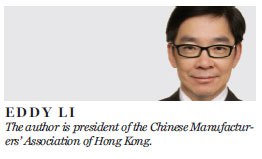Expanding IVS would be a big help for tourism industry
Updated: 2015-10-08 08:51
By Eddy Li(HK Edition)
|
|||||||||
The other day, Secretary for Commerce and Economic Development Gregory So Kam-leung spoke to the media about the challenges facing tourism in the SAR. He said that the number of visitors to Hong Kong in the first eight months of 2015 declined slightly by 0.1 percent from the same period last year, with mainland visitors increasing by 0.8 percent and non-mainlanders dropping by 3.4 percent. As for the first half of September, total visitors dropped by 1.7 percent compared to the same period last year, with decreases in both categories - 0.2 percent for mainlanders and 6.4 percent for others.
The weakness in the tourism sector has negatively affected the retail sector. By July, retail sales had suffered from a five-month decline. The total retail sales in July were HK$37.6 billion. This indicated a 2.8 percent decline compared to the same period in 2014.
Chief Executive Leung Chun-ying has repeatedly emphasized the importance of tourism to Hong Kong's economy. It is closely related to the hotel, retail, and other industries. Leung said July's tourism figures were a great disappointment. He urged all parties to work together to preserve Hong Kong's fine reputation as a city which welcomes visitors.
I think that there are two main reasons for the unsatisfactory numbers in the tourism sector. The first is the strong performance of the Hong Kong dollar, due to it being pegged to the US dollar. This has in effect led to higher prices for visitors, reducing their desire to come to Hong Kong for shopping. What is more, not long ago, the People's Bank of China allowed wider fluctuations for the renminbi (RMB). This resulted in depreciation of the RMB, further weakening the attractiveness of Hong Kong as a tourist destination. Meanwhile, mainland tourists are also finding Japan and Europe more attractive as their currencies have depreciated by a bigger magnitude than the RMB.
The other factor is that the anti-visitor campaigns by some "localists" have seriously damaged the international image of Hong Kong. Some activists in recent years have repeatedly resorted to radical behavior, disregarding social norms or even breaking the law. This phenomenon was particularly evident after the failure of the illegal "Occupy Central" movement last fall. The troublemakers have escalated their actions into the "anti-locust" campaign directed at mainland visitors. Their ugly behavior has disgraced Hong Kong. As a result, many mainland visitors have shunned the city after watching video clips of such incidents.
Facing this kind of predicament, what can we do to rescue and revitalize our tourism sector? First, I think it is important that these troublemakers are punished for the damage they have caused. Second, we need to attract more overnight visitors as they are bigger spenders compared with day trippers.
According to figures from the Census and Statistics Department, the number of overnight visitors dropped by 11.6 percent in July compared with the same period last year. The average hotel room occupancy in July was only 85 percent, down 7 percent year-on-year. The most efficient way to boost overnight visitors is to expand the Individual Visit Scheme (IVS) to more mainland cities. Since its initial implementation in July 2003, the scheme has been expanded to only 49 cities over the past 12 years. Currently, most cities covered by the scheme are in the south, including all cities in Guangdong and capital cities in other provinces.
With the rapid economic growth all over the country, the consumption capacity of residents in the northern part of the country can no longer be neglected. More importantly, due to the demands of long-distance travel, those visitors are more likely to stay overnight when they visit Hong Kong, thus generating more demand for goods and services. The SAR government should discuss with the central government the feasibility of adding more northern cities to the IVS list. This would rapidly improve Hong Kong's tourism situation.

(HK Edition 10/08/2015 page10)